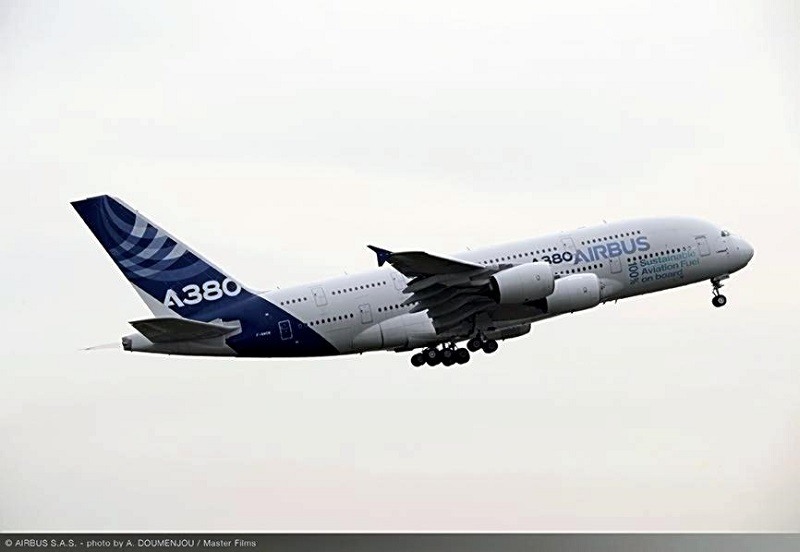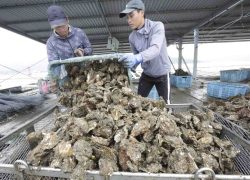
An Airbus A380 passenger plane
2:00 JST, April 12, 2022
The move toward sustainable aviation fuel (SAF) derived from cooking oil, household garbage and other materials is gaining momentum in the airline industry, which has been the target of criticism overseas because of the high carbon dioxide emissions associated with flying.
In late March, aircraft manufacturer Airbus SE flew an A380 jumbo jet for about three hours powered solely by SAF for a test flight in Toulouse in southwestern France, indicating the safety of SAF and signaling a wave of change in the aviation industry.
The term “flight shaming” was popularized by environmental activist Greta Thunberg. In 2019, the Swedish teenager crossed the Atlantic Ocean by yacht when she traveled to the U.N. headquarters in New York for a climate summit, instead of traveling by plane.
Jet fuel derived from crude oil is responsible for most of the carbon dioxide emissions produced by the airline industry, which has come under increased scrutiny amid a global push for decarbonization.
The sense of urgency is particularly strong in Europe, where environmental issues attract more attention. European countries have started setting goals for the introduction of SAFs, which currently account for less than 1% of the total global supply of aviation fuels.
In Norway, it has been mandatory for airlines to use SAF mixed with other fuels since 2020, and Britain wants 75% of aviation fuel to be powered by SAFs by 2050.
A shift has also been seen among Japanese airlines. In March, All Nippon Airways, Japan Airlines and 14 other companies established an organization called Act For Sky to promote the use of domestically produced SAFs.
The organization, whose members include Nissin Foods Holdings Co., Odakyu Electric Railway Co. and a manufacturer of fuels derived from cooking oil, is working to secure raw materials and establish distribution networks.
ANA and JAL, competitors in the aviation industry, have already joined hands to promote the use of SAFs. In June, both airlines flew regular flights using fuel mixed with sustainable aviation fuel derived from microalgae and wood chips.
The government wants 10% of the aviation fuel used by domestic airlines to be SAFs by 2030.
The International Civil Aviation Organization, a United Nations agency, aims to adopt this year a target of net-zero carbon dioxide emissions among international airliners by 2050. As a result, efforts by the world’s airlines are likely to accelerate.
“European and North American airlines might cut trips to Japan if planes cannot refuel with SAFs at Japanese airports,” said a senior official of the Land, Infrastructure, Transport and Tourism Ministry.
Securing raw materials is one of many challenges that lie ahead.
Euglena Co. produces health foods made from a type of algae called euglena, and also manufactures fuel derived from the aquatic organism and used cooking oil.
Last year, Honda Aircraft Co. flew a HondaJet private plane using an SAF manufactured by Euglena, which plans to build a mass production site in the future so that it can supply fuel to major airlines.
In urban areas, there are multiple sources of used cooking oil, such as restaurant chains, so procurement is not expected to be difficult.
However, price inflation has been seen due to demand among overseas manufacturers and an industry insider predicts tough competition to secure used cooking oil in Japan in the future.
Keeping costs down will be a challenge, too. SAFs are three to four times the price of conventional aviation fuels. ANA wants companies to shoulder part of the burden in return for certificates to use the fuel.
Top Articles in Science & Nature
-

Japan Institute to Use Domestic Commercial Optical Lattice Clock to Set Japan Standard Time
-

iPS Treatments Pass Key Milestone, but Broader Applications Far from Guaranteed
-

Record 700 Startups to Gather at SusHi Tech Tokyo in April; Event Will Center on Themes Like Artificial Intelligence and Robotics
-

iPS Cell Products for Parkinson’s, Heart Disease OK’d for Commercialization by Japan Health Ministry Panel
-

Japan to Ban Use of Power Banks on Airplanes
JN ACCESS RANKING
-

Japan PM Takaichi’s Cabinet Resigns en Masse
-

Japan Institute to Use Domestic Commercial Optical Lattice Clock to Set Japan Standard Time
-

Israeli Ambassador to Japan Speaks about Japan’s Role in the Reconstruction of Gaza
-

Man Infected with Measles Reportedly Dined at Restaurant in Tokyo Station
-

Videos Plagiarized, Reposted with False Subtitles Claiming ‘Ryukyu Belongs to China’; Anti-China False Information Also Posted in Japan






















